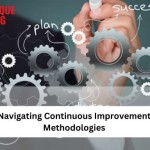Process Management Mapping and Improvement is a systematic approach organisations employ to enhance efficiency, streamline operations, and optimise resource utilisation. It involves the detailed analysis and visualisation of existing processes to identify bottlenecks, redundancies, and areas for enhancement.
Organisations gain a comprehensive understanding of their workflows through techniques like flowcharts, value stream mapping, and process modelling. This understanding is a foundation for implementing strategic improvements, such as automation, standardisation, and reengineering. Continuous monitoring and feedback loops ensure that the processes remain adaptable and responsive to evolving business needs.
Ultimately, Process Management Mapping and Improvement fosters a culture of innovation and continuous improvement within organisations, leading to increased productivity, cost savings, and customer satisfaction.
Upon completion of this course, participants will be able to:
- Gain insights into business procedures and their elements.
- Employ techniques for process visualisation, assessment, and examination.
- Outline procedures utilising a segment of Business Process Modeling Notation (BPMN).
- Assess the functionality of a business process.
- Implement methods for enhancing business processes.
This course is designed for anyone responsible for project management and continuous organisational improvement. It would be most beneficial for:
- Business Owners
- Project Managers
- Operations Managers
- Directors
- Chief Executives
- Team Leaders
- Financial Managers
- Risk Assessors
- IT Consultants
- Data Analysts
- Change & Control Managers
This course uses a variety of adult learning styles to aid full understanding and comprehension. Participants will see real-world case studies of project plans aiming for continuous improvement from start to finish. They will review a trainer-led presentation to discuss the best project management tools and understand how to present their project plans to relevant stakeholders best to secure approval and budget.
They will then work together on group projects to identify process pain points and plan for changes based on data analysis. They will conduct a role-playing activity to present their project plan scope and budget requirements to relevant stakeholders in order to obtain approval.
Day 5 of each course is reserved for a Q&A session, which may occur off-site. For 10-day courses, this also applies to day 10
Section 1: Identifying the Need for Change
- Recognising the necessity for change.
- Understanding drivers of organisational change.
- Identifying signs indicating change is needed.
- Evaluating the impact of change on stakeholders.
- Case studies on successful change initiatives.
- Tools for assessing the need for change.
- Communication strategies for promoting change awareness.
Section 2: Generating an Effect Process Map
- Understanding the importance of process mapping.
- Identifying key processes within an organisation.
- Mapping out processes flows accurately.
- Identifying bottlenecks and inefficiencies.
- Utilising tools and techniques for effective process mapping.
- Collaborating with stakeholders to refine process maps.
- Case studies on successful process mapping implementations.
Section 3: PDCA ACT of Process Change
- Introduction to the PDCA cycle for process change.
- Understanding the Plan-Do-Check-Act framework.
- Applying PDCA principles to process improvement initiatives.
- Implementing planned changes and monitoring results.
- Assessing the effectiveness of process changes.
- Iterative refinement of processes through the PDCA cycle.
- Case studies demonstrating PDCA in action.
Section 4: Data to Support Your Hypothesis
- Understanding the role of data in hypothesis testing.
- Identifying relevant data sources for hypothesis validation.
- Collecting and organising data effectively.
- Analysing data to support or refute hypotheses.
- Interpreting statistical results to draw conclusions.
- Utilising data visualisation techniques for hypothesis communication.
- Evaluating the reliability and validity of data used in hypothesis testing.
Section 5: Process Analysis & Improvement
- Identifying inefficiencies and bottlenecks in processes.
- Applying Lean and Six Sigma methodologies for process improvement.
- Implementing process mapping and value stream analysis.
- Utilising data-driven approaches for process analysis.
- Developing strategies for continuous process improvement.
Section 6: Benchmarking & Evaluating Your Process Changes
- Key performance indicators for process evaluation.
- Comparing process performance against industry standards.
- Analysing the effectiveness of process changes.
- Benchmarking data to drive continuous improvement.
- Strategies for adjusting processes based on evaluation results.
- Utilising metrics to quantify process improvements.
- Assessing the impact of process changes on efficiency and quality.
- Incorporating feedback loops for ongoing process evaluation.
- Aligning process changes with organisational goals and objectives.
- Leveraging benchmarking data to identify areas for further improvement.
- Monitoring trends and patterns to ensure sustained process enhancement.
- Collaborating with stakeholders to refine evaluation criteria and methodologies.
Upon successful completion of this training course, delegates will be awarded a Holistique Training Certificate of Completion. For those who attend and complete the online training course, a Holistique Training e-Certificate will be provided.
Holistique Training Certificates are accredited by the British Assessment Council (BAC) and The CPD Certification Service (CPD), and are certified under ISO 9001, ISO 21001, and ISO 29993 standards.
CPD credits for this course are granted by our Certificates and will be reflected on the Holistique Training Certificate of Completion. In accordance with the standards of The CPD Certification Service, one CPD credit is awarded per hour of course attendance. A maximum of 50 CPD credits can be claimed for any single course we currently offer.
- Course Code PO4-126
- Course Format Classroom, Online,
- Duration 5 days














